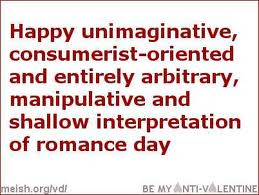As you might have noticed (or, if you managed not to, colour me shocked), yesterday was February 14th, Valentine's day. As a child, I always kind of liked Valentine's day. You got to make pretty little mailbox crafts in school, and you'd get fun cards from the kids in your class. Valentine's was an outpouring of love. It was, of course artificial love, and even back then, centered around the expectation that you'd give cards to receive them. But, I didn't mind. The point was, back then, everyone was included, even the odd kid in your class who never said a word and picked his nose a lot. Even he got a card that said 'I like you!' So what if it was lies?

As we age, however, Valentine's stops being inclusive. It becomes a day that is to be celebrated with a significant other, or alone with a pint of Haagen Daas (or a bottle of tequila for the true lonely hearts). Valentine's becomes a contrived observance steeped in expectation once you reach a certain age. For those who are single, it is a reminder of thus. For those who are coupled, men have an expectation to perform, (and not in the enjoyable way), and (some) women feel entitled to their one day a year flowers and chocolates. For serious? This is how we express love?
In high school, my sis Michelle and I decided that this whole day was balls. One V-day, I made her a card, that said "Happy Two Cool Sisters Day!" (proving just how nerdy we really were). Every year thereafter, we still wish each other a Happy Two Cool Sisters day. My sister is married, and she still refuses to celebrate Valentine's day. This makes me proud.

The thing is, I really love love. I adore everything about it. I love seeing expressions of love, and the way people who are truly in love interact with each other. I am by no means a bitter single person. I am full of happiness and pleasure and joy. My Auntie Doriann's birthday happens to also be valentine's day, and her partner wrote her a song, and posted it on facebook for all to see. I love that. I love seeing two people I adore joining their lives together; I love seeing people who after 40 years together, like my parents, are still totally happy and in love. It makes me so happy to see people become stronger, better-off people because they have that positive force in their life. I just honestly feel like Valentine's day doesn't celebrate love, it celebrates the expectation of what love should be. People who are in love are lucky, and in my opinion, every day is their day. There is absolutely nothing more sublime than the feeling of being in love. As my older sister K says: "Love is my favourite drug".
Maybe my hate-on for Valentine's day is actually born of my love of love, and I hate seeing something so amazing corrupted by this red and pink teddy bear heart chocolate long stem roses crap that gets vomited over everything for the first few weeks of February. If you love someone, and you want to get them a gift to show them that, by all means go for it. But, please, make it something that is actually of meaning to them, rather than one of these clichés that are so horribly overdone.
The last several years (whether or not I was in a relationship), I've made a point of spending Valentine's day with my friends. I've had Valentines with 8 people over pitchers and wings, Valentines that have turned into kitchen dance parties lubricated by excessive amounts of tequila, Valentines at the movies watching a slasher horror flick, and this year, I had a nice Valentine's with my roomie, working out and making a nice dinner together, followed by crochet and House. I love celebrating love, you see. I just don't like being told how to do it.
Yesterday, I got a message from my ex, wishing me a happy V.D. I wrote back, and said "Happy Venereal Disease to you, too!" And then I laughed.







 People in high school who weren't victims or perpetrators of bullying were almost certainly bystanders, the problem being that pervasive in schools. Almost everyone witnesses bullying. Sometimes, someone speaks. Sometimes, someone will come to another person's defense, but, that's rare. I had close, lifelong friends who witnessed me being bullied and stood by without speaking. They were good, kind people, but terrified of provoking the bullies and creating enemies for themselves. Much research indicates that if we find a way to remove the bystander, we remove all of the bully's power. Bullying rarely happens without witnesses; that would defeat its purpose as a social tool.
People in high school who weren't victims or perpetrators of bullying were almost certainly bystanders, the problem being that pervasive in schools. Almost everyone witnesses bullying. Sometimes, someone speaks. Sometimes, someone will come to another person's defense, but, that's rare. I had close, lifelong friends who witnessed me being bullied and stood by without speaking. They were good, kind people, but terrified of provoking the bullies and creating enemies for themselves. Much research indicates that if we find a way to remove the bystander, we remove all of the bully's power. Bullying rarely happens without witnesses; that would defeat its purpose as a social tool.